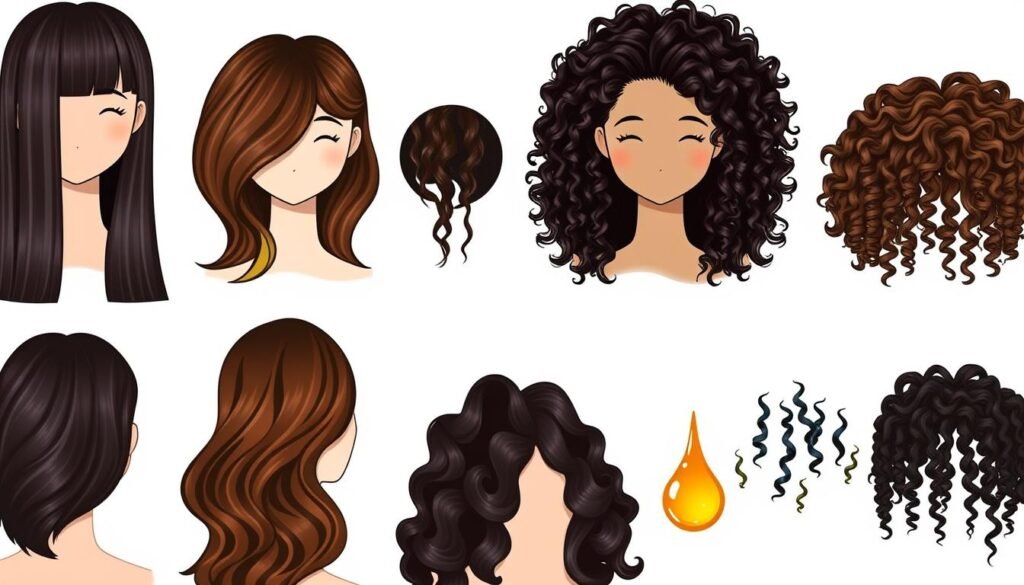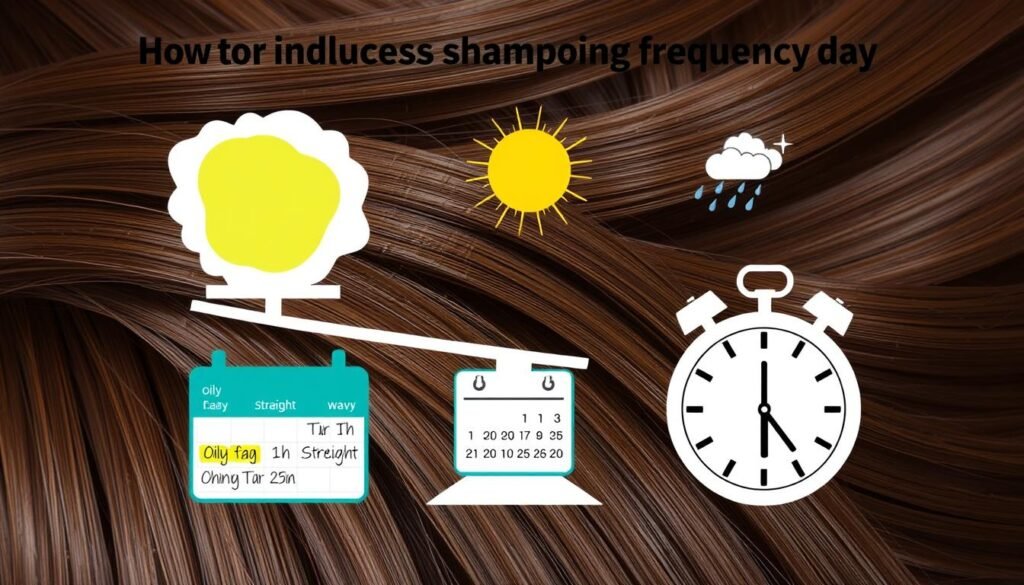Did you know teens and adults in their 20s and 30s make more sebum than older people? This fact changes how often they should wash their hair. While many think washing it daily is needed, studies show washing every 2 to 3 days is better. Understanding the right frequency for shampooing is key for a healthy scalp.
Each person’s hair care needs are different. This article explores what affects how often you should shampoo. Factors include hair texture, lifestyle, and the environment. Plus, we’ll look into how too much washing can harm your hair, and the importance of natural oils.
For more tips on customizing your hair care routine, check out this hair care resource. It’s full of great advice for keeping your hair and scalp in top shape.
Key Takeaways
- Understanding natural sebum production can guide how often to wash hair.
- Most people benefit from a hair washing schedule of every 2 to 3 days.
- Thin hair often requires more frequent washing than thicker textures.
- Lifestyle factors, including environment and physical activity, impact shampooing frequency.
- Overwashing can strip hair of essential oils, leading to dryness.
- Customizing a hair care routine is essential for maintaining scalp health.
The Importance of Shampooing for Scalp Health
Keeping your scalp clean is very important for its health. Washing your hair regularly helps get rid of oil and dirt. This is a big part of taking good care of your scalp. If you don’t, you might get problems like dandruff, itchy skin, and blocked hair roots. These issues can stop your hair from growing well.
Studies show that washing your hair many times a week is good for it. People seem happier with their hair and scalp if they wash it five to six times a week. Washing every day can help more than just once a week. Doing this can reduce dryness and itching. This is especially true for those with seborrheic dermatitis or psoriasis.
Using the right shampoo is key. Every scalp is different. If you have an oily scalp, find a shampoo that cleans well. But if your hair is dry or curly, you might not need to wash it as often. This can help keep your hair healthy.
It’s important not to wash your hair too much or too little. Experts say you shouldn’t go more than 14 days without washing. Washing your hair too seldom can cause scalp sensitivity. It can also make your hair quality worse.
| Washing Frequency | Expected Benefits | Potential Issues with Low Frequency |
|---|---|---|
| 5-6 times per week | Optimal scalp health, reduced irritation | None observed in healthy individuals |
| Daily | Improved scalp condition, less flaking | None in populations without scalp pathologies |
| Every other week | Maintained moisture in curly/dry hair | Increased dandruff, scalp sensitivity |
| 14 days or more | Feels less stripped | Increased likelihood of scalp issues |
Choosing the right shampoo and washing the right amount can really help your hair. Keeping your scalp healthy is important for good hair care. This will make your hair look and feel better.
Understanding Natural Oils and Their Role
Natural oils are key for great hair health. The scalp makes oils like sebum. These oils moisturize hair and skin. It’s important to keep these oils balanced for healthy hair.
What is Sebum?
Sebum is an oil made by glands in the scalp. It keeps hair moist and safe from damage. Too much washing can remove sebum. This leaves hair dry and weak. Sebum also protects against pollution and makes hair shine.
Benefits of Natural Oils for Hair
Adding natural oils to your hair care can do a lot of good. These oils are full of nutrients and boost hair health. Let’s look at some:
- Coconut oil is great for stopping protein loss in hair, thanks to lauric acid.
- Sesame oil helps the scalp by giving it vitamins and minerals, making it healthier.
- Almond oil has vitamin E, which fights stress in hair and supports growth.
- Argan oil is a natural softener with vitamins A, C, E, and omega-3 fats.
- Moringa oil deeply hydrates dry hair. It’s very moisturizing.
Using these oils can keep moisture in, balance the scalp, and make hair healthier. For the best results, clean your scalp well and use special treatments. This approach helps a lot. Check out this article for tips on scalp care.

How Often to Shampoo for Healthy Scalp
Finding the right shampooing frequency is key for scalp and hair health. Every person is different. They need to consider their hair type, lifestyle, and scalp health. There are general rules that help decide how often to wash.
General Guidelines for Shampooing Frequency
Washing hair two to three times a week works for many. It keeps hair clean and moisturized. But, those with thin or oily hair might need to wash more, like daily, to control oil. People with thick or curly hair can go longer, maybe five to seven days, without washing.
Using soft shampoos, especially sulfate-free ones, is good. They keep hair’s natural oils safe. Colored hair should be washed less to stay bright. Maybe every other day or every three days. Following hair care tips is smart. Use conditioner mostly on the ends, not the scalp, to prevent buildup.
Common Myths About Shampooing Too Often
There are many myths about washing hair. One common myth is that all types need daily washing. But, washing too much can make hair dry and weak. It can also irritate the scalp. On the other hand, not washing enough can increase oil and cause dandruff.
It’s important to know your hair and adjust how often you wash. Each type of hair has its best washing schedule. This keeps it healthy without harm. Learning the truths about shampooing helps people make better hair care choices.
Identifying Your Hair Type
Knowing your hair type is key for a great hair care routine. Hair needs vary, so the right shampoo and products are a must. This guides you through understanding if your hair is thin, thick, curly, or coarse. It helps you find your type and how to care for it.
Thin vs. Thick Hair Needs
Fine hair may get oily fast and may need more washes. When caring for this hair type, remember:
- Volume-boosting shampoos, like those from GK Hair, help control oil.
- Too many moisturizing products can make fine hair limp.
Thick hair doesn’t need washing as often. For thicker hair, consider:
- GK Hair Moisturizing Shampoo nourishes without extra grease.
- Clarifying shampoos help keep moisture but remove buildup.
Curly and Coarse Hair Considerations
Curly hair calls for special care to avoid dryness and keep curls well-defined. For curly locks, it’s good to use:
- Moisturizing shampoos, like GK Hair CurlsDefineHer, for better curls and less frizz.
- It’s crucial to find the right balance in your care routine to prevent drying out.
Coarse hair, with its thicker texture, benefits from specific care, like:
- Products with natural oils, such as argan oil, boost shine and moisture.
- Washing coarse hair too much can dry it out, so it’s important to balance shampooing.

Adapting your hair care routine to your hair type is important. Knowing your hair type lets you pick the right products. This ensures your hair stays healthy and looks great.
Factors Influencing Shampooing Frequency
Have you ever wondered how often you should wash your hair? There are several factors that affect this. Understanding these factors helps manage different hair types. It’s about knowing your hair’s condition, how active you are, and the environment around you. These insights guide a personalized hair care plan.
Oiliness and Hair Condition
How much oil your scalp produces is key. People with oily hair or who use many styling products might need to wash their hair every 1–2 days. On the other hand, those with dry hair might wash less often. If you have textured or coily hair, once every 1–2 weeks might work. The American Academy of Dermatology Association (AAD) says tailor your washing to your hair type. For example, oily hair might need daily washes while coily hair does not.
Physical Activity and Sweat Levels
Your workout routine affects your washing needs. Exercise means sweat, and sweat brings salt and dirt to your scalp. This might mean washing your hair more often to keep your scalp healthy. People who work out a lot tend to adjust their washing routine to their level of sweat. This helps especially with oily hair management.
Environmental Influences
Your environment impacts your hair and scalp. Pollution, climate, pollen, and dust cling to your hair. You might need more frequent washes to get rid of this buildup. Daily exposure to these elements can increase oiliness and cause scalp problems. So, it’s important to consider these environmental factors when choosing your hair care routine.

To manage your hair care routine well, understanding these factors is crucial. Adjusting your shampoo frequency based on personal and environmental factors helps maintain healthy scalp and hair. For deeper insight, check out this guide on shampooing frequency.
Shampooing Frequency by Hair Type
Choosing the right shampooing frequency for your hair type is key. It can transform the care for fine and curly hair. Different hair types need different washing schedules. This knowledge helps keep hair and scalp healthy. Here, we outline what works best for each hair type.
Fine Hair: Daily to Every Other Day
People with fine hair see oil build-up quickly. It’s best to wash fine hair daily or every other day for a clean look. Choose a gentle sulfate-free shampoo. This keeps hair shiny without causing damage.
Medium Hair: Every 2-4 Days
Medium hair is in a balanced state, needing washes every two to four days. This lets natural oils nurture the hair but not make it greasy. Opt for a hydrating shampoo to keep moisture and have healthy hair.
Thick and Curly Hair: Weekly or Every Other Week
Thick and curly hair types tend to be drier. The natural oils don’t spread evenly. Washing once a week or every other week is usually enough. A moisturizing shampoo should be used. It helps keep moisture in and reduces frizz, key for curly hair.
| Hair Type | Recommended Frequency | Shampooing Tips |
|---|---|---|
| Fine Hair | Daily to Every Other Day | Use a gentle sulfate-free shampoo |
| Medium Hair | Every 2-4 Days | Hydrating shampoo recommended |
| Thick and Curly Hair | Weekly or Every Other Week | Moisturizing shampoo for hydration |
Signs It’s Time to Shampoo
Knowing when to shampoo is key for keeping your hair and scalp healthy. You’ll see signs when it’s time to cleanse away dirt, oils, and buildup. Recognizing these signs to shampoo will improve your hair care routine. It helps keep your hair looking vibrant and well-cared-for.
When Your Hair Feels Dirty or Greasy
Feeling your hair greasy or dirty means it’s time to wash it. Not washing can make your hair even oilier, especially when it’s hot out. This can make your hair look dull and feel heavy.
Fine hair might need to be shampooed daily or every other day. But coarse or curly hair does not need to be washed as often. This way, you can maintain your hair’s health without overwashing.
Indicators of Build-up and Dandruff
Product build-up, oils, and sweat can make your hair look not so nice. It can also cause dandruff. These build-up indicators make your scalp itchy and flaky. A sign it’s time for a good wash.
If your hair gets tangled easily or smells bad, you should probably shampoo it. Washing your hair regularly helps prevent dandruff. It keeps your scalp clean and healthy.
Natural Hair Care Alternatives
Many people today want healthier hair care routines. They’re finding natural ways to care for their hair. These methods are kinder and help keep the scalp healthy. One popular option is co-washing. It uses a silicone-free conditioner instead of harsh shampoos. This can nourish your hair more gently.
Understanding Co-Washing
Co-washing is more than a trend. It changes how we think about cleaning our hair. It keeps your scalp’s natural oils while removing dirt. Also, the ‘no poo’ movement is getting popular. It means using little or no shampoo. This lets your scalp balance its oils naturally. People say their hair looks healthier and isn’t as itchy.
The Rise of the ‘No Poo’ Movement
The ‘no poo’ movement suggests using things like baking soda or apple cider vinegar. Even just warm water works. These methods are cheap and gentle. They also fit well with caring for the environment. Try herbal shampoo bars or rice water rinses for even better hair. For tips on starting with these methods, check out this natural hair care guide.